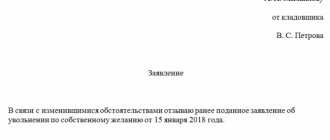Author of the article: Yulia Kaysina Last modified: January 2021 10846
If an employee breaks the law, he can be fired unilaterally. Theft is one of the offenses that can become grounds for terminating an employment contract. Dismissal for theft in the workplace threatens employees who intentionally misappropriate, damage or destroy property that does not belong to them. But the fact of an offense alone is not enough to terminate an employment contract. An appropriate decision of a court or official is required. Only after this the employer has the right to issue a dismissal order.
What does stealing at work mean?
Article 158 of the Criminal Code of the Russian Federation clearly interprets the concept of “theft”. This is the seizure of property with a mercenary motive in favor of guilty persons with damage to the rightful owners. The only things that can be stolen are:
- materially valuable;
- created by human economic activity;
- belonging to movable property.
Stealing a pair of gloves at work can be considered theft. The illegality of an act is not determined by the level of value of the thing. The fact is that the stolen products belonged to the enterprise and that the offense was intentionally committed. The location of the theft is also important. If a worker grabbed gloves from the market on the way to work and did not pay, the employer has no reason to fire him.
But on the other hand, for a certain category of personnel, workplaces are not only offices or factory workshops:
- couriers deliver documents and goods to addresses, they are responsible for their lawful activities for delivery points;
- the driver transports passengers, and the garage of the motor transport enterprise and the car belong to the places of his employment;
- a builder is building a house for a private owner, if he starts stealing the owner’s building materials, it will be theft at work.
Attention! A person is not exempt from liability if he stole things and the working day ended or was a day off.
Unintentional breakdown of a valuable device is not considered theft, and you can request a refund for this. Damaging property for personal reasons, and not for selfish reasons, is an act of vandalism, but not theft.
Why do employees steal and how do they succeed?
Some people will never steal because their moral convictions prevent them from doing so. People with more flexible ethics decide to steal when several factors coincide:
- dissatisfaction with your salary,
- open access to goods and other valuables,
- imperfection of the accounting system, due to which theft and the identity of the thief are not immediately detected.
If your company's actual profits differ markedly from forecasts, for the worse, take a closer look at your employees. Perhaps the most dishonest of them have more than once resorted to one of these ways to get rich right in the workplace.
Bought goods at inflated prices
This is what scammers who are entrusted with procurement do. It works like this: let’s say a businessman opened a cafe and instructed his employee to search for suppliers of some products. The employee turned out to be dishonest, as was the supplier, and as a result of their collusion, the cafe owner will pay 2,000 rubles per unit of goods, which rightfully costs a third less. The difference in price will be shared by the employee and the supplier.
Indicated the wrong quantity of goods
Another variant of collusion is intentional errors in invoices. If the goods arrive in large quantities, from hundreds of units, it is not so difficult to indicate in the documents a different quantity and, accordingly, the cost.
For example, an employee who is responsible for receiving goods at a warehouse is tasked with ordering 120 boxes of cat food, each containing 24 cans. Thus, 2,880 canned goods should arrive at the warehouse. But the employee asks the equally dishonest supplier to indicate 2,980 in the invoice and issue an invoice for the required amount. In fact, 2,880 units of goods arrive at the warehouse, according to documents - a hundred more. The non-existent 100 canned goods are written off as defective, and the overpayment is divided between the store employee and the supplier.
Barcodes were re-glued
A simple method of theft: re-stick barcodes from cheap goods to more expensive ones and sell them to “your own” - customers with whom the dishonest employee is in cahoots. Even if someone suddenly sees a cashier punching the wrong item, it will be impossible to prove that the barcode was deliberately pasted over.
Not all products were scanned
Another scheme that requires “its own” buyer. He brings several identical goods to the checkout, and the cashier scans and punches only one in the receipt. Even if you catch a fraudster in the act, he can always say that the scanner simply did not read the other barcodes and it is not his fault. But he cannot scan products and at the same time monitor whether they are displayed correctly in the shopping list. After all, no one needs queues at the checkout.
Replaced goods with cheaper ones
A popular scheme in stores that sell bulk products by weight. An unscrupulous seller may replace expensive, high-quality spices or tea with cheaper ones. It is not always possible to determine a substitution by appearance. And even if there is a meticulous buyer who suspects something is wrong, the seller will throw up his hands: what arrived at the warehouse is displayed on the sales floor.
Products were written off ahead of time
Products whose consumer properties may deteriorate over time must have an expiration date indicated. These are food products, cosmetics, perfumes, medicines, etc. An unscrupulous seller may mark something that he decided to take for himself for free as subject to write-off, although everything is in order with expiration dates and presentation.
They made their own assessments
The seller adds an expensive item to the markdown section in the simplest commodity accounting system that he wants to buy himself at a good discount. Naturally, the store management did not plan such a markdown. As soon as the discounted product leaves the warehouse, an interested employee immediately buys it.
Some sellers deliberately spoil or crumple the packaging, or cause non-critical damage (for example, scratching) in order to have a basis for a discount and subsequent repurchase. This scheme also works in the opposite direction, when a dishonest employee sells discounted goods at the price that existed before.
The check was closed after payment
Works in the case of inattentive customers who pay in cash and leave without waiting for the check to be issued. The cashier enters his personal discount, closes the receipt, and takes the difference in price for himself.
Additional items included in the check
This fraud scheme is also designed for buyers who take many goods at once, pay for them, but do not check receipts and do not collect them. The cashier can check the same product twice or add a product to the check that the buyer did not take, and after the latter leaves, make a check for cancellation and pocket the money.
It is possible that the fraudster will come across a meticulous buyer who, at the risk of incurring the wrath of the line at the checkout, will check the receipt. But the risks of punishment here are low: you can always refer to a system error and issue a refund.
"Rented" goods
If you only need an expensive item for a couple of times, is it worth buying it? No, of course not, you can just take it and use it. This is how dishonest salespeople in clothing or equipment stores argue. Tried and tested outfits and gadgets are returned to the hall and continue to be sold at the price of new goods.
What does the Labor Code of the Russian Federation say about theft?
Legal provisions established by law cannot be interpreted ambiguously. It is important to correctly understand the wording prescribed in the Labor Code of the Russian Federation. An employer may interpret an employee’s actions as theft, but it is not a fact that a court will interpret an unlawful act in the same way.
The basic concepts of dismissing employees due to theft are explained by the Labor Code in the articles:
- No.81 clause 6 pp. “d” – the employment contract is terminated after the court decision enters into legal force.
- No. 57 - states that if employees work at a subsidiary, in a branch of the main production complex, then these points of employment are their places of employment; when sent on a business trip to another company, they will be responsible by law for committing theft while fulfilling their obligations at this workplace.
- No. 261 - a restriction has been established on the dismissal of pregnant women; such employees can only be subject to disciplinary punishment.
- No. 193 - prohibits the imposition of double penalties; if an employee has been fined, he cannot be dismissed.
In addition to legislative norms, there are rules in the Labor Code of the Russian Federation:
- Dismissal is possible if it is proven that the theft occurred at the place of work, which reflects the employment agreement, this is the specific address of the enterprise, office or factory.
- Theft is the appropriation of someone else's valuable material assets that are not his property. The theft of equipment, equipment, technical devices or devices, as well as things belonging to other employees by a company leased by a company, is recognized as an unlawful act.
When charging, the presence of malicious intent must be confirmed and the crime must be proven. If an employee took the wrong briefcase or confused his own with another among 2 identical ones, this is an unintentional act for which he will not be fired.
What the law says
The possibility of unilaterally dismissing an employee who has committed theft at the place of work is enshrined in paragraphs. "d" clause 6 of Art. 81 Labor Code of the Russian Federation. The extent of the theft does not matter - a sanction can be imposed even if the damage is minor. It also does not matter who suffered from the guilty actions - the employer, colleagues or third parties (for example, clients or partners of the company).
In addition to theft, grounds for dismissal may include:
- waste of money or material assets;
- intentional damage or destruction of property.
Expert commentary
Platonov Alexander
Lawyer
Even if the violator is caught red-handed, this is not enough for dismissal. First, his guilt must be recognized by a court or an official authorized to consider cases and make decisions on administrative offenses. Only after the decision comes into force can the employer, for its part, apply sanctions to the culprit, including dismissal under the article for theft.
Is it possible to fire someone for theft without a court verdict?
Not every entrepreneur is ready to contact law enforcement agencies in order to “not wash dirty linen in public.”
According to legal regulations, dismissal is possible under the following conditions:
- there is a court verdict in which the employee’s guilt is recognized, the verdict is in legal force;
- less than a month after the theft.
Important! The court decision becomes valid after the deadline for appealing it has expired.
Employers, in order not to aggravate the situation, negotiate with the employees who committed the theft. They do not record the fact in the work book, but dismiss them at their own request. There is another option to say goodbye to an unwanted employee - due to loss of trust, the basis provided for by the Labor Code of the Russian Federation, Article 81, paragraph 7.
Responsibility measures
An employee who decides to commit such an act should be prepared for the fact that he will bear responsibility, but what kind of responsibility depends on the severity of the offense committed.
Let's talk separately about what will await the criminal upon the onset of each measure of responsibility.
Civil responsibility
First of all, according to the norms of labor legislation, a crime is the basis for full financial liability. It implies compensation for damage at current prices.
The final decision is made by the court. However, it is possible that the parties may enter into an amicable agreement. Under its terms, the employee can return the stolen property or provide an equivalent replacement.
Administrative responsibility
If the theft committed at the place of work was insignificant (within 1000 - 2500 rubles), then administrative liability may arise.
As part of it, the culprit faces a fine, arrest for 15 days, or compulsory work for a certain duration. All sanctions are prescribed in Art. 7.27 Code of Administrative Offenses of the Russian Federation.
Criminal liability
Establishes criminal liability for theft at work, Art. 158 of the Criminal Code of the Russian Federation. It contains several parts that establish sanctions depending on the method of theft and the amount of damage caused to the enterprise.
In what cases is liability not imposed?
To do this, it is necessary to provide comprehensive evidence of the employee’s innocence. For example, if he is accused of stealing funds, then you can try to prove that he did not have access to the organization’s finances or sign documents related to the money.
Also read: How theft is described in the administrative code: its types and responsibility
To build the right line of defense, you should also establish the specific place and time of the crime. If there were witnesses or everything was recorded by surveillance cameras, then this will serve a good purpose in acquitting the unjustly accused employee.
You should also immediately contact an experienced lawyer who can help you understand this issue. You should study the following documents with him:
- employment contract;
- agreement on liability;
- job description.
How to fire an employee for theft
The procedure begins with filing a claim in court; for this you need to collect evidence. When a theft is detected, the persons who discovered the fact send a memorandum to the management of the enterprise, where they indicate under what circumstances the violation occurred, and date the document.
If a shortage is identified during inventory, the data is recorded in the act. The offender must provide written explanations for his offense. If the culprit refuses an explanatory note, a separate act must be drawn up. This is a mandatory procedure for which the Labor Code of the Russian Federation under Art. 193 does not provide for exceptions.
The following evidentiary materials are attached to the statement of claim:
- witness statements;
- recording of illegal actions by video cameras;
- reporting and explanatory notes;
- conclusion of the commission of internal investigation.
After contacting the judicial authority, where the proceedings are initiated, a decision is made based on the issues considered.
Having received a copy of the verdict, the employer must issue 2 orders:
- in accordance with Article 192 Part 3 of the Labor Code of the Russian Federation on bringing an employee to disciplinary action with termination of the employment contract;
- the employment agreement is terminated on the basis of a court decision.
In order 2, the manager indicates all measures of influence on the employee, the numbers of previous orders and the court verdict. The documents are presented under the signature of the culprit. The reason for dismissal is included in the labor report - according to Article 81, Part 1, Clause 6, due to theft at the enterprise. It is not allowed to replace or soften the wording. They also decipher the basis on which each order was issued.
The issuance of a dismissal order is possible after the court decision is in legal force. The defendant is given time to deny his guilt.
On the day the employee signs the dismissal order, it must be calculated and issued:
- with labor records;
- salary;
- money for days of unused vacation and various additional income.
The employer does not have the right to independently withhold damages from the employee’s earnings; penalties are carried out through civil proceedings.
We don't need thieves!!! Analysis of judicial practice when dismissing an employee for theft
In Russia, the most common immoral offense is theft of someone else's property. Theft often occurs at the place of work. Accordingly, every employer, having identified this fact, will not want to continue further employment relations with the employee who committed theft. However, dismissing an employee for committing theft at work is not always easy, even if the employer has all the evidence.
In the event of theft (including small) of someone else's property at the place of work, embezzlement, intentional destruction or damage, the employer has the right to dismiss the employee under paragraphs. "g" clause 6, part 1, art. 81 Labor Code of the Russian Federation. According to the instructions of the Plenum of the Supreme Court of the Russian Federation, any property that does not belong to this employee should be regarded as someone else’s property, in particular the property of the employer, other employees, as well as persons who are not employees of this organization. For dismissal on the above grounds, it is only important that the specified actions were performed at the place of work.









